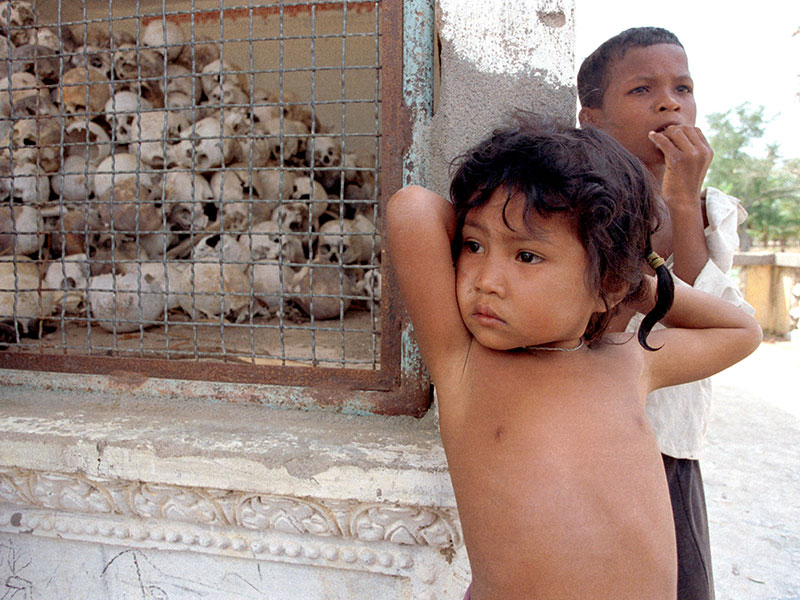Crimes Against Humanity
Background

UN Photo/John Isaac
It is not clear in which context the term “crimes against humanity” was first developed. Some scholars[1] point to the use of this term (or very similar terms) as early as late eighteenth and early nineteenth century, particularly in the context of slavery and the slave trade, and to describe atrocities associated with European colonialism in Africa and elsewhere such as, for example, the atrocities committed by Leopold II of Belgium in the Congo Free State. Other scholars[2] point to the declaration issued in 1915 by the Allied governments (France, Great Britain and Russia) condemning the mass killing of Armenians in the Ottoman Empire, to be the origin of the use of the term as the label for a category of international crimes.
Since then, the notion of crimes against humanity has evolved under international customary law and through the jurisdictions of international courts such as the International Criminal Court, the International Criminal Tribunal for the former Yugoslavia and the International Criminal Tribunal for Rwanda. Many States have also criminalized crimes against humanity in their domestic law; others have yet to do so.
Crimes against humanity have not yet been codified in a dedicated treaty of international law, unlike genocide and war crimes, although there are efforts to do so. Despite this, the prohibition of crimes against humanity, similar to the prohibition of genocide, has been considered a peremptory norm of international law, from which no derogation is permitted and which is applicable to all States.
The 1998 Rome Statute establishing the International Criminal Court (Rome Statute) is the document that reflects the latest consensus among the international community on this matter. It is also the treaty that offers the most extensive list of specific acts that may constitute the crime.
Definition
Rome Statute of the International Criminal Court
Article 7
Crimes Against Humanity
- For the purpose of this Statute, ‘crime against humanity’ means any of the following acts when committed as part of a widespread or systematic attack directed against any civilian population, with knowledge of the attack:
- Murder;
- Extermination;
- Enslavement;
- Deportation or forcible transfer of population;
- Imprisonment or other severe deprivation of physical liberty in violation of fundamental rules of international law;
- Torture;
- Rape, sexual slavery, enforced prostitution, forced pregnancy, enforced sterilization, or any other form of sexual violence of comparable gravity;
- Persecution against any identifiable group or collectivity on political, racial, national, ethnic, cultural, religious, gender as defined in paragraph 3, or other grounds that are universally recognized as impermissible under international law, in connection with any act referred to in this paragraph or any crime within the jurisdiction of the Court;
- Enforced disappearance of persons;
- The crime of apartheid;
- Other inhumane acts of a similar character intentionally causing great suffering, or serious injury to body or to mental or physical health.
- For the purpose of paragraph 1:
- ‘Attack directed against any civilian population’ means a course of conduct involving the multiple commission of acts referred to in paragraph 1 against any civilian population, pursuant to or in furtherance of a State or organizational policy to commit such attack;
Elements of the crime
According to Article 7 (1) of the Rome Statute, crimes against humanity do not need to be linked to an armed conflict and can also occur in peacetime, similar to the crime of genocide. That same Article provides a definition of the crime that contains the following main elements:
- A physical element, which includes the commission of “any of the following acts”:
- Murder;
- Extermination;
- Enslavement;
- Deportation or forcible transfer of population;
- Imprisonment;
- Torture;
- Grave forms of sexual violence;
- Persecution;
- Enforced disappearance of persons;
- The crime of apartheid;
- Other inhumane acts.
- A contextual element: “when committed as part of a widespread or systematic attack directed against any civilian population”; and
- A mental element: “with knowledge of the attack”
The contextual element determines that crimes against humanity involve either large-scale violence in relation to the number of victims or its extension over a broad geographic area (widespread), or a methodical type of violence (systematic). This excludes random, accidental or isolated acts of violence. In addition, Article 7(2)(a) of the Rome Statute determines that crimes against humanity must be committed in furtherance of a State or organizational policy to commit an attack. The plan or policy does not need to be explicitly stipulated or formally adopted and can, therefore, be inferred from the totality of the circumstances.
In contrast with genocide, crimes against humanity do not need to target a specific group. Instead, the victim of the attack can be any civilian population, regardless of its affiliation or identity. Another important distinction is that in the case of crimes against humanity, it is not necessary to prove that there is an overall specific intent. It suffices for there to be a simple intent to commit any of the acts listed, with the exception of the act of persecution, which requires additional discriminatory intent. The perpetrator must also act with knowledge of the attack against the civilian population and that his/her action is part of that attack.
[1] For example, William Schabas, Unimaginable Atrocities – Justice, Politics, and Rights at the War Crimes Tribunals, Oxford University Press, 2012 – p. 51-53.
[2] For example, M. Cherif Bassiouni, Crimes Against Humanity in International Criminal Law, Martinus Nijhoff Publishers, 1999, p.62
- https://www.un.org/en/genocideprevention/crimes-against-humanity.shtml

Leave a Reply
You must be logged in to post a comment.